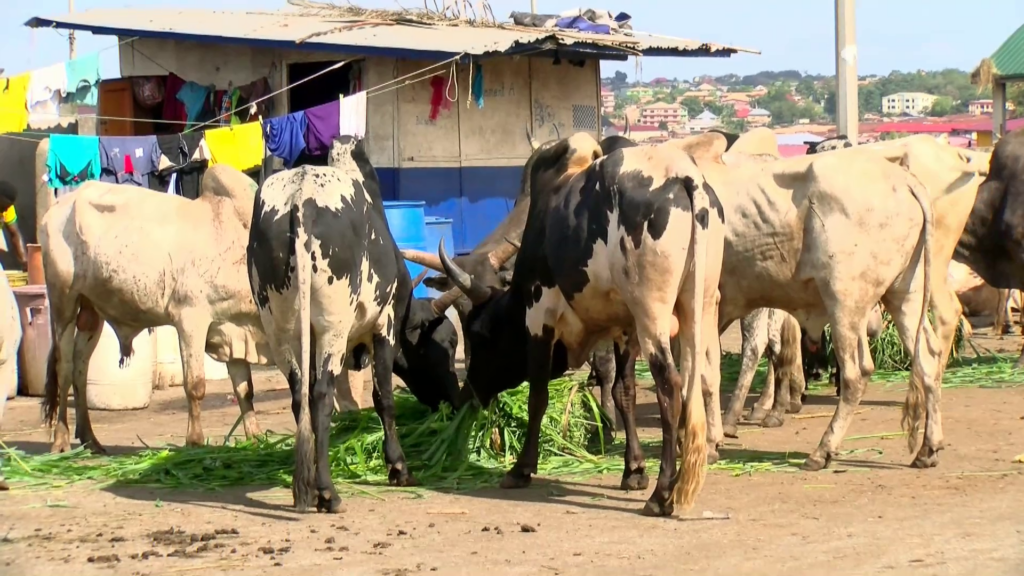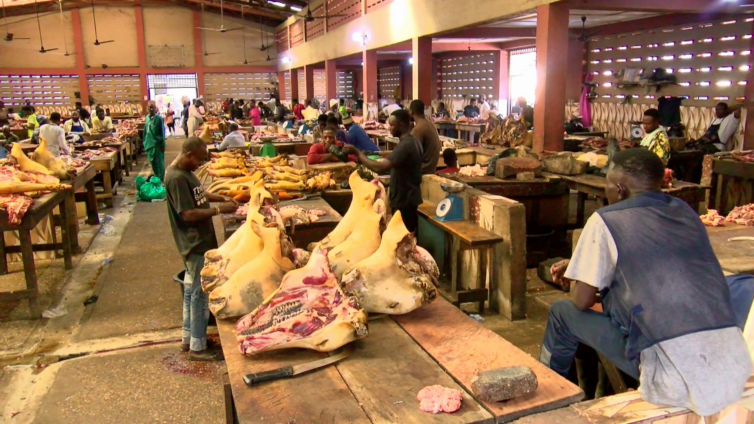Butchers in the Ashanti Region are decrying the importation of foreign meat products into the local market.
According to them, about 80% of their customers prefer cheap imported meat to fresh ones on the local market.
Some have abandoned their tables in pursuit of other trades.
The number of livestock slaughtered daily in Kumasi is reducing.
A leader of the butchery section at the Kumasi Abattoir, Mallam Mustapha, is worried some of his men have moved to other markets within the Metropolis to meet sales targets.
“Ten years ago, we used to slaughter about 200 or 250 cows daily. But now the foreign meat has destroyed our market. Now, the highest we slaughter is 120 or 150. That meat is not good for us,” he revealed.
Customers of the butchers prefer the imported frozen cow parts such as the intestines, head and legs, compared to the locally processed products.
“We are not spoiling their market, but the imported meat is not healthy. I heard the government is going to ban their activities. That is the correct thing to do. It will help people buy the fresh meat we produce. It is expensive but healthy,” he said.
The cattle business is passed from generation to generation.
After dealing in livestock farming for over 40 years, Tijani Alhaji Abdul Rahaman Naanah is unwilling to hand over the trade to his offspring.

Cattle rearing is becoming increasingly expensive.
“I don’t want my children to take up this job. The job is too hard now. The cattle are expensive and people cannot buy them. From 1980 the price of cattle increased. The price of cattle is over 10,000 cedis,” he revealed.
Cows are currently imported from neighbouring Ivory Coast, Burkina Faso, Mali and Niger. Meanwhile, the foreign exchange rate is hampering their ability to purchase cows.
“Many people bring their cattle from Burkina Faso and Ivory Coast. In Ghana, our cattle are only produced during the rainy season,“ he said.
Production Manager at the Kumasi Abattoir Company Limited, Michael Tongban, is calling for the revamping of the meat industry.
The abattoir employs over 1,000 workers and has the potential to employ more.
Data from the Ministry of Food and Agriculture shows Ghana produces 10% of the meat it consumes, with the livestock sector contributing about 1.3% to Ghana’s GDP.
Latest Stories
-
Baltasar Coin becomes first Ghanaian meme coin to hit DEX Screener at $100K market cap
49 seconds -
EC blames re-collation of disputed results on widespread lawlessness by party supporters
15 minutes -
Top 20 Ghanaian songs released in 2024
37 minutes -
Beating Messi’s Inter Miami to MLS Cup feels amazing – Joseph Paintsil
50 minutes -
NDC administration will reverse all ‘last-minute’ gov’t employee promotions – Asiedu Nketiah
1 hour -
Kudus sights ‘authority and kingship’ for elephant stool celebration
1 hour -
We’ll embrace cutting-edge technologies to address emerging healthcare needs – Prof. Antwi-Kusi
2 hours -
Nana Aba Anamoah, Cwesi Oteng special guests for Philip Nai and Friends’ charity event
2 hours -
Environmental protection officers receive training on how to tackle climate change
2 hours -
CLOGSAG vows to resist partisan appointments in Civil, Local Government Service
3 hours -
Peasant Farmers Association welcomes Mahama’s move to rename Agric Ministry
3 hours -
NDC grateful to chiefs, people of Bono Region -Asiedu Nketia
3 hours -
Ban on smoking in public: FDA engages food service establishments on compliance
3 hours -
Mahama’s administration to consider opening Ghana’s Mission in Budapest
3 hours -
GEPA commits to building robust systems that empower MSMEs
3 hours

